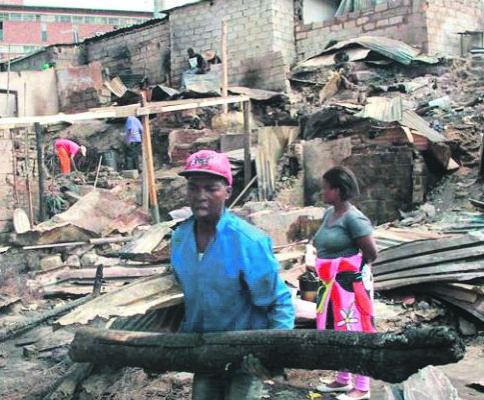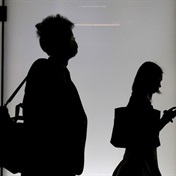
To spread, fire provides the energy for atoms in one gaseous compound to break their bonds with each other and combine with available oxygen atoms.
Fire uses oxygen to break down the bonds between atoms.
This atomisation is the converse of the brave new connected world promised by technology companies.
Rather than extending commonalities, technology has reinforced our class, race, gender, language, geography and sexuality divisions.
Society has fractured into information silos and echo chambers – awash with outrage.
Social media, rather than exposing us to a multiplicity of voices and ideas, ensures we hear only what we want to and we remain unchallenged in our ideas.
The spread of sensational and fake news, the kind feeding our paranoias and prejudices, is the fire that breaks humanity’s connective bonds.
This atomisation uses the oxygen required for curiosity, exploration, gaining knowledge, developing empathy and solidarity, and articulating a humane praxis.
We cannot breathe. We are suffocating our personal and political imaginations and, consequently, we have stopped feeling.
Stefan Goosen, a journalist at the Knysna-Plett Herald, who covered last year’s Knysna fire, pointed out a perverse characteristic of the social media responses to the destruction: The widespread celebration that the majority of victims were white people from the middle and upper classes.
“I actually smiled when I saw that Knysna is going thru it all, ’cause we all know what the majority of the population is there [emoji],” read one tweet.
The responses argued the privileged would “finally know what poor black people go through in this country,” one Facebooker posted.
A sentiment absurdly shared, for different reasons, by white people who spoke of “now knowing” what it felt like to “have nothing”.
A spurious argument. Many of those who lost their homes and belongings in the Knysna fires were insured and easily replaced them.
Accommodation was provided through their racialised class networks in the town.
Home affairs set up a special process to replace identity documents quickly.
The Knysna fire also saw an unprecedented societal response. Companies like Discovery Health, Standard Bank and Absa donated millions of rands towards the relief effort, as did ordinary citizens.
Most of this money is still unspent because, well, the rich didn’t really need it.
The government, business, the media and the class and race networks, which sympathised with those affected by the Knysna fire reacted instantaneously to the crisis.
This is not how poor black people experience the aftermath of a fire which has destroyed their homes and belongings, and killed their loved ones.
At Fannin Road, outside Durban, the ruins of the two-room shack where the girls lived with their mother remain untouched.
A physical reminder of a trauma that lingers much deeper in every member of the Mtolo family, who were too poor to afford counselling, or to be recognised as in need of it by the state’s dysfunctional welfare system.
A few weeks after Knysna went up in flames in July last year, there was a fire in Alexandra, Johannesburg. About 120 shacks were destroyed, leaving more than 1 000 people homeless.
Days afterwards some residents were still living on the street and community leaders said they had yet to receive any “clear communication directly from the government” as to what relief, accommodation, food and clothes would be provided for people who had lost everything: Birth certificates, identity documents, school textbooks, carefully guarded family heirlooms.
A week later the community and emergency services were still “pleading” with charities and individuals to donate clothes and food.
Whether in outrage or in solidarity, social media remained distinctly unanimated by the Alex fire. The atomisation we experience and articulate on the internet was palpable in our failure to respond.
Alex residents were invisible while even the pampered pets of Knysna had names and a warm place to sleep.
Antonio Gramsci – an Italian Marxist philosopher – noted the “common sense” of ordinary people contributed to the establishment of social morals and values.
In this corrosive technological moment we are more individualistic and insular despite our deeply traumatic and violent history behoving us to act otherwise.
In South Africa the contemporary media’s failure to create an inclusive public sphere has its roots in apartheid.
The racialised class divisions initiated by colonialism and apartheid were entrenched by the commercial Afrikaans and English print media which targeted class elites as readers — ignoring the majority black population.
Publications aimed at black audiences, such as Drum and The World, were either bought by groups like the then Argus and dumbed down or intimidated and banned into closing down.
The Afrikaans press largely supported the apartheid regime.
The English press, owned mainly by mining companies and riddled with newsroom spies, was also complicit in supporting apartheid by not opposing it – only the alternative and international media did.
The mainstream media’s business models created information silos before the internet. Social media and the internet as the “outrage machine” have reinforced these antagonistic ethnic and class consciousnesses.
This is hazardous for ordinary citizens and their relationship to one another and to power.
It is the death knell for the media – it means journalists remain wrapped up in their ever-present biases and subjectivities, increasingly articulated in their work.
This is an extract of the speech Tolsi gave at the Ruth First Memorial Lecture at Wits University this week
TALK TO US
What has happened to us? We’re a nation lacking empathy, especially if the victims are black.
SMS us on 35697 using the keyword FIRE and tell us what you think. Please include your name and province. SMSes cost R1.50. By participating, you agree to receive occasional marketing material




 Publications
Publications
 Partners
Partners








